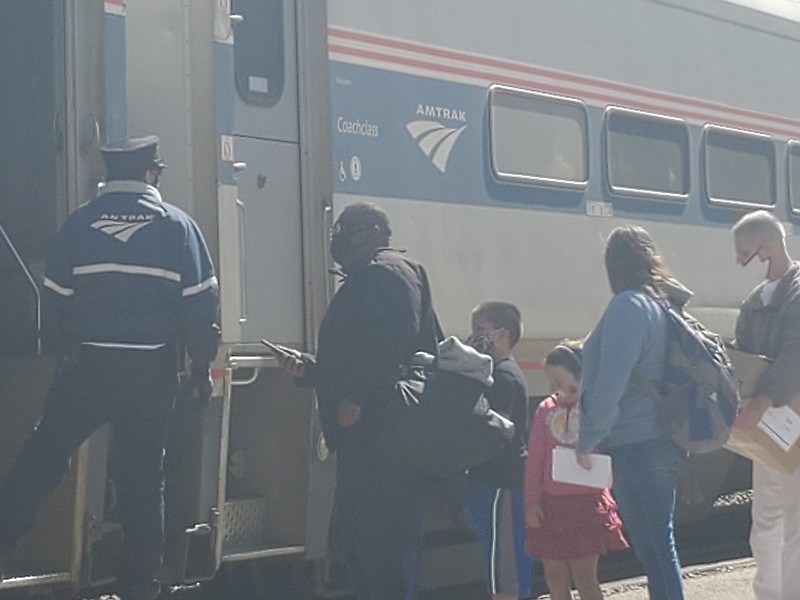"If you run 'em, we'll ride 'em," a railroad advocacy group proclaimed in a rally Thursday at the Capitol, calling upon state lawmakers to restore daily cross-state passenger service to its pre-COVID-19 levels.
The comment was made by Richard Eichhorst, president of the American Association of Railroaders, based in St. Louis. The association seeks to have Amtrak's Missouri River Runner service to once again have two cross-state trains running east from Kansas City to St. Louis and two trains going west from St. Louis to Kansas City.
Not long after the pandemic began in March 2020, the River Runner service went down to one train a day in each direction due to declining ridership.
Currently, the eastbound morning train out of Kansas City gets to St. Louis at 1:45 p.m. The westbound St. Louis train leaves at 4 p.m. and gets to Kansas City just before 10 p.m.
"If nothing more, we'd like for them to restore the full service for a six-month trial," Eichhorst said. "We're wanting them to not just restore passenger rail service but expand and improve it. We have already put out money for new coaches with other states to be used on Amtrak trains so we want them delivered and put in service."
The first round of refreshed Amtrak passenger cars were cycled into service in 2019. The cars had new upholstery and paint. Last year, more new passenger cars were scheduled to be delivered and put into service.
"There are a number of colleges along the line, and students often take the train to get to their homes," Eichhorst added. "Tourism is big in Hermann and Washington on this route, and we had planned annual trips with the AAR group, but those were canceled because you can't make a round trip in one day with the current form of service."
Amtrak announced earlier this month they would go back to running their long distance trains at full service at the end of May or early June. This includes the Texas Eagle and Southwest Chief, both of which go through Missouri.
Eichhorst said many other states are looking to start to run their in-state Amtrak services once again in July.
Troy Hughes, Missouri Department of Transportation administrator of railroads, said a decision has not been made on returning to four trains a day.
"State-sponsored Amtrak service in Missouri, like in other states, is subject to legislative appropriation and gubernatorial approval," Hughes said. "As the budget is discussed, MoDOT will continue to provide information to the Legislature on the value of this transportation option for Missourians."
In fiscal year 2021, Hughes said MoDOT received $8 million in state support for the River Runner service. Amtrak employs 78 people statewide, amounting to approximately $7.5 million in labor income.
Ed Hassinger, MoDOT's deputy director and chief engineer, told the Railroaders group that MoDOT did request two trains a day in their budget for this year, but Gov. Mike Parson only approved funds for the current service.
"In this legislative session, we're through the budget process in the House, and we do have money for one train a day in each direction there," Hassinger said. "Every year, we have the funding discussion because you can't use highway funds to fund rail service. The money comes from the general revenue fund.
"We're losing ground because there are not as many legislators that are interested in passenger rail service in Missouri. The lawmakers that do have Amtrak in their area do get it's importance."
Hughes said revenue from the River Runner service was $5.4 million and ridership was 145,725 during the 10-month period from April 1, 2018, through Jan. 31, 2019.
For the same 10-month period, April 1, 2020, to Jan. 31, 2021, the revenue was $1.5 million and ridership was 35,252. Hughes noted they were comparing last year to 2018-19 revenue and ridership due to the effect Missouri River flooding had on ridership in 2019.
When asked if federal COVID- relief funds could be used to help fund Amtrak service, Hughes said previous federal COVID-relief packages did include funds for Amtrak to use on state-supported routes, such as the Missouri River Runner. So additional federal funds could be used if passenger rail service is an eligible expense of the program, he said.
State Rep. Aaron Griesheimer, R-Washington, told the railroaders: "I've always said this is a fall-on-the-sword issue for me, and I will continue to fight for Amtrak service across the state. I will work with the Senate to restore multiple trains to Amtrak service."
His father, John Griesheimer, who served as a state representative for 10 years and as a state senator for eight years, helped to get Amtrak to stop in Washington in the late 1990s.
On a related matter, Jefferson City officials confirmed no decision has been made about the temporary Amtrak station nor any movement on a potential permanent location for the station.
The temporary station has been in operation since the fall of 2019. The station had been housed in the lower floor of the historic Union Hotel, but when that building was found to have structural problems, the state closed its doors. State officials said the hotel would remain closed for the foreseeable future due to lack of funding for repairs.
For now, the temporary station in the parking lot of the Jefferson Landing State Historic Site remains in place after the city received a six-month extension from the Office of Administration at the end of last year to keep it there.

